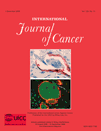Intraperitoneal administration of a small interfering RNA targeting nuclear factor-kappa B with paclitaxel successfully prolongs the survival of xenograft model mice with peritoneal metastasis of gastric cancer
Abstract
Activation of nuclear factor-kappa B (NF-κB) has been detected in various malignant tumors, including gastric carcinoma, and is associated with tumor growth, metastasis, resistance to chemotherapeutic agents and poor prognosis. Therefore, NF-κB is a potential target for antitumor therapy. In this study, we used a small interfering RNA (siRNA) to knockdown NF-κB p65 expression and determined whether intraperitoneal administration of NF-κB p65 siRNA and paclitaxel was effective for treating peritoneal metastasis of gastric cancer. Western blot analysis revealed that NF-κB p65 expression was diminished by NF-κB p65 siRNA. Apoptotic cells were increased after transfection of NF-κB p65 siRNA compared with control siRNA in the treatment with paclitaxel. In a murine xenograft model, abundant fluorescence was observed on the surface of intraperitoneal nodules of gastric cancer after siRNA administration. Moreover, intraperitoneal administration of NF-κB p65 siRNA reduced NF-κB expression in intraperitoneal nodules of gastric cancer. Finally, mice treated by intraperitoneal administration of NF-κB p65 siRNA and paclitaxel survived for a significantly longer time than mice treated by intraperitoneal administration of paclitaxel alone (p = 0.0002). Taken together, the present results demonstrate that intraperitoneal administration of NF-κB p65 siRNA and paclitaxel inhibited cancer growth in mice with peritoneal metastasis of gastric cancer. Therefore, intraperitoneal administration of NF-κB p65 siRNA and paclitaxel may provide a breakthrough in the treatment of peritoneal metastasis of gastric cancer. © 2008 Wiley-Liss, Inc.




